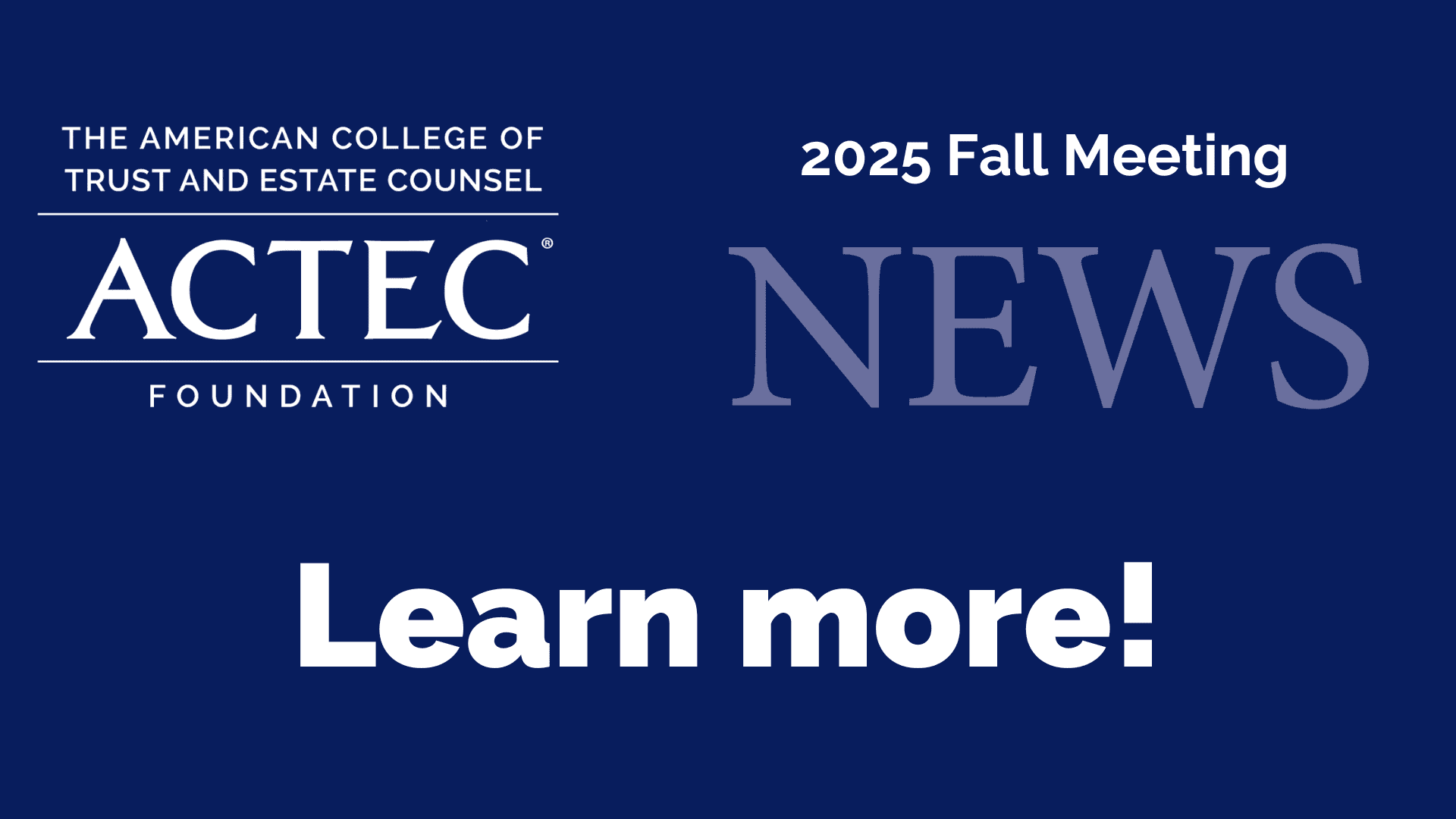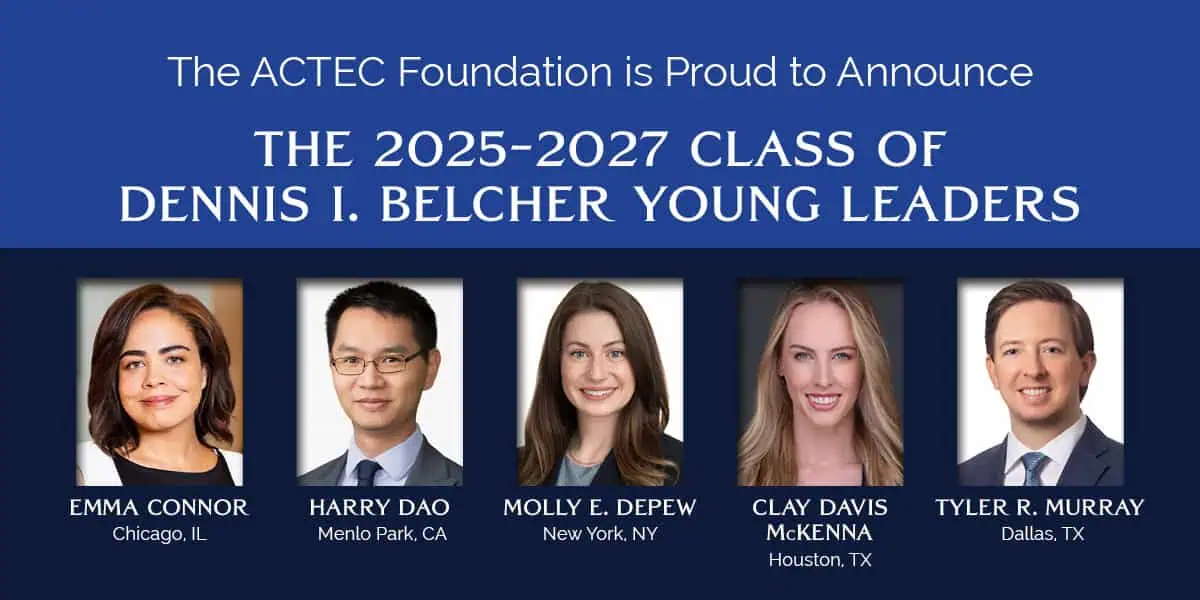The ACTEC Foundation Announces the Winners of the 2025 Mary Moers Wenig Student Writing Competition
FOR IMMEDIATE RELEASE
Contact: Rebecca Vandall
202-465-8270
Washington, DC, July 22, 2025: John T. Rogers, Jr., President of The ACTEC Foundation, and Elizabeth A. Bawden and Gerry W. Beyer, Co-Chairs of the Legal Education Committee of The American College of Trust and Estate Counsel (ACTEC), are pleased to announce the winners of the 2025 Mary Moers Wenig Student Writing Competition.
First-Place Winner
Chase Kristofer Duncan for “The Right of Publicity Predicament: Valuing a Postmortem Asset in the Context of Future Technological Development”
“I am honored to be awarded first place in the 2025 Mary Moers Wenig Student Writing Competition! I am grateful to my faculty advisor, Professor John Becker, for his encouragement to submit my paper and his guidance throughout the process. I also appreciate The ACTEC Foundation for supporting education in trusts and estates, an area of the law that I find particularly fascinating. I hope my paper encourages discussion about how to best conduct the valuation of various assets for estate tax purposes, as the environments that shape these valuations change.”
Second-Place Winner
Amanda Covaleski for “Inheriting the Right to Reclaim: When Copyright Termination Rights Supersede Testamentary Wishes”
“I thank ACTEC and the competition judges for selecting my paper as the second place winner. I owe a special thanks to Professor Kathy Mandelbaum, whose guidance helped me shape a nebulous idea and multiple rough drafts into a piece I was proud to submit to ACTEC. Writing this paper was a wonderful opportunity to explore a legal passion and deepen my knowledge of estate planning and its intersection with other areas of the law. I’m thankful to the judges for finding the tension between inheritance law and copyright as compelling as I do.“
Third-Place Winner
Pierson Broadwater for “Will of the Voiceless: Aphasia and the Shortcomings of the Testamentary Capacity Doctrine”
“I am sincerely grateful for the recognition of my work by ACTEC and the judges, and am honored to receive this award. I owe special thanks to Professor Bridget Crawford, not only for her guidance and mentorship as I completed this project, but also for introducing me to the field of trusts & estates and the many interesting and important issues therein. It is my hope that my paper, in however small a way, helps lift the voices of aphasia patients and raises awareness of this devastating condition.”
Honorable Mention Winners
Abigail Dood for “Clarifying the UTC § 603 Chaos: A Survey of State Approaches to Settlor Incapacity in Revocable Trusts”
Arizona State University – Sandra Day O’Connor College of Law
Daniel Perkins for “QTIP Terminations & § 2519: A Tale of Gift Taxing Complexity”
New York University School of Law
Julia Madeleine Perry for “Conception from Beyond the Grave: Posthumous Gamete Retrieval, Heirship, and a Rebuttable Presumption of Non-Consent”
University of San Diego School of Law
Clay Saffran-Johnson for “Codifying Heggstad Petitions in California”
UC Davis School of Law
The winning papers will now be considered for publication in the ACTEC Law Journal. Following print publication, all papers will be published on The ACTEC Foundation website.
ACTEC’s Legal Education Committee focuses on the quality and relevance of trust and estate courses offered in law schools, strategies for incorporating skills training into courses, ideas for mentoring new lawyers in estate planning, the role of adjunct professors, and trust-and-estate-related scholarship, case law, statutory law, and current developments. The committee oversees the Mary Moers Wenig Student Writing Competition. The panel of committee members who served as judges in this year’s competition includes ACTEC Fellows Gerry W. Beyer, Karen Elizabeth Boxx, Naomi Cahn, Charles D. (Skip) Fox, IV, David Horton, Anne-Marie Rhodes, Barbara A. Sloan, Douglas (Doug) Stanley, and John A. (Jack) Terrill, II.
Randolph (Randy) Harris, who coordinated the judging process on behalf of the Legal Education Committee, shares: “This year’s competition saw an impressive number of submissions from law students across the country, and the overall quality of writing and analysis was exceptional, making the judging process quite challenging. The prize-winning entries stood out for their originality, clarity, and thoughtful engagement with both emerging and traditional trust and estate issues.”
A total of 32 papers were received from students at the following schools:
- Albany Law School
- Berkeley Law
- Brigham Young University J Reuben Clark Law School
- Florida International University College of Law
- Georgetown University Law Center
- New York University School of Law
- Northwestern Pritzker School of Law
- Notre Dame Law School
- Sandra Day O’Connor College of Law – Arizona State University
- South Texas College of Law Houston
- Temple Law
- Texas Tech School of Law
- UC Davis School of Law
- University of Baltimore School of Law
- University of Denver – Sturm College of Law
- University of Georgia School of Law
- University of Miami School of Law
- University of San Diego School of Law
- University of Utah S.J. Quinney College of Law
- Vanderbilt Law School
This annual legal writing competition is supported by The ACTEC Foundation to encourage law students to create scholarly works in trusts and estates. The first-place winner receives a full-tuition scholarship to the Heckerling Graduate Program in Estate Planning at the University of Miami School of Law for the 2026–2027 or the 2027–2028 academic year, a $5,000 cash award, and will have their paper published in the ACTEC Law Journal. The second-place winner receives a $3,000 cash award, online publication of their paper on The ACTEC Foundation website, and possible publication in the ACTEC Law Journal. The third-place winner receives a $1,000 award, online publication of their paper on The ACTEC Foundation website, and possible publication in the ACTEC Law Journal. Honorable mention recipients receive a $500 cash award.
About The ACTEC Foundation: The ACTEC Foundation is the philanthropic arm of The American College of Trust and Estate Counsel (ACTEC). The Foundation is a nonprofit, 501(c)(3), that promotes scholarship and education for families and professionals and supports students interested in the trust and estate area of the law. Through continued financial support, The ACTEC Foundation offers professional development, scholarships, and education for a number of important efforts, including legal education, educational support, public initiatives, legal publications, and the student editorial board of the ACTEC Law Journal.
About The American College of Trust and Estate Counsel (ACTEC): Established in 1949, The American College of Trust and Estate Counsel (ACTEC) is a national, nonprofit association of approximately 2,400 lawyers and law professors from throughout the United States and abroad. ACTEC members (Fellows) are peer-elected on the basis of professional reputation and expertise in the preparation of wills and trusts, estate planning, probate, trust administration, and related practice areas. The College’s mission includes the improvement and reform of probate, trust, and tax laws and procedures, and professional practice standards. ACTEC frequently offers technical comments with regard to legislation and regulations but does not take positions on matters of policy or political objectives.
###
Latest ACTEC Trust and Estate Talk Podcasts
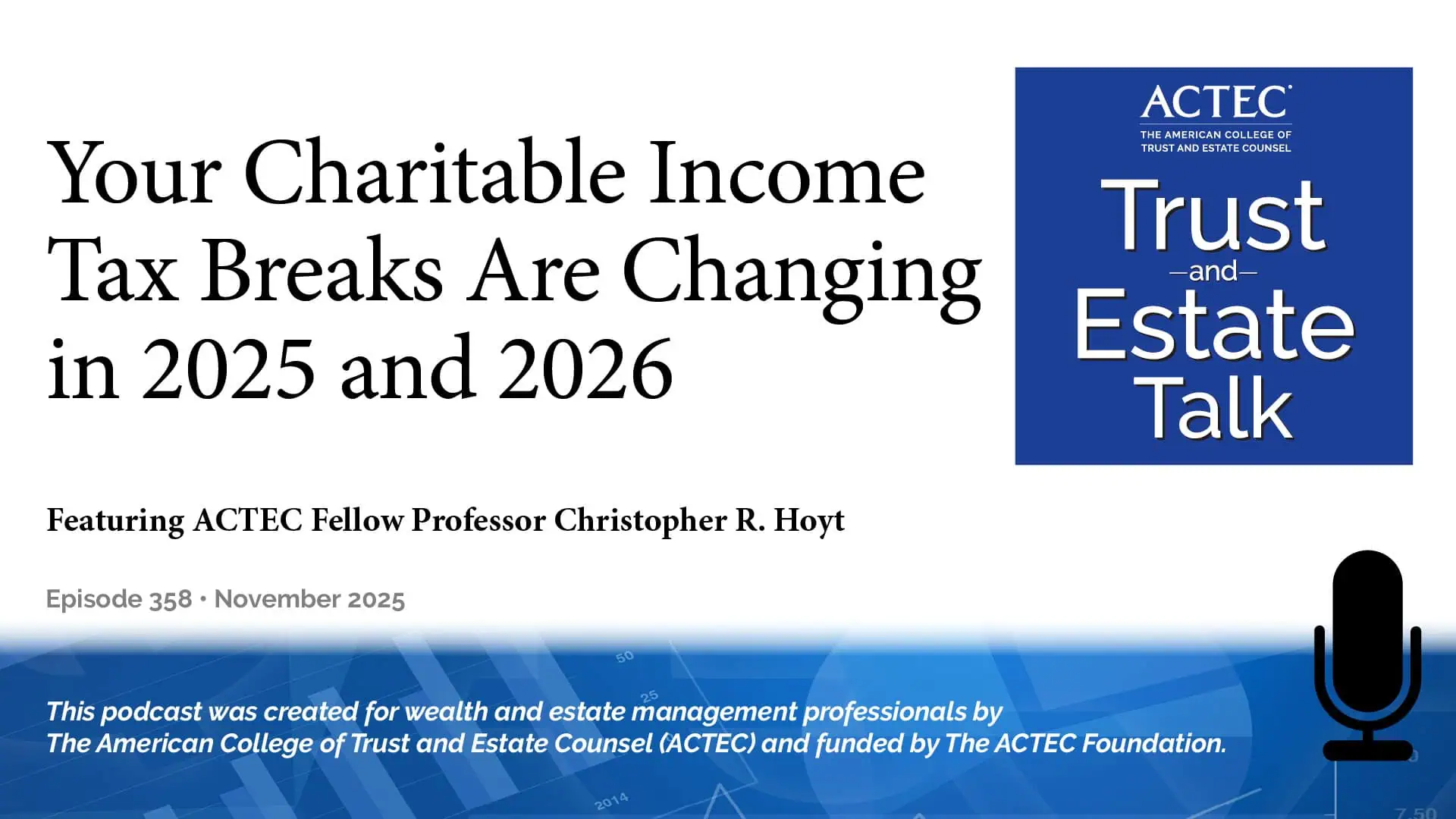
Your Charitable Income Tax Breaks Are Changing in 2025 and 2026
Learn how 2025–2026 tax changes impact charitable deductions, DAFs, and SALT limits, plus smart year-end giving and IRA gift strategies.
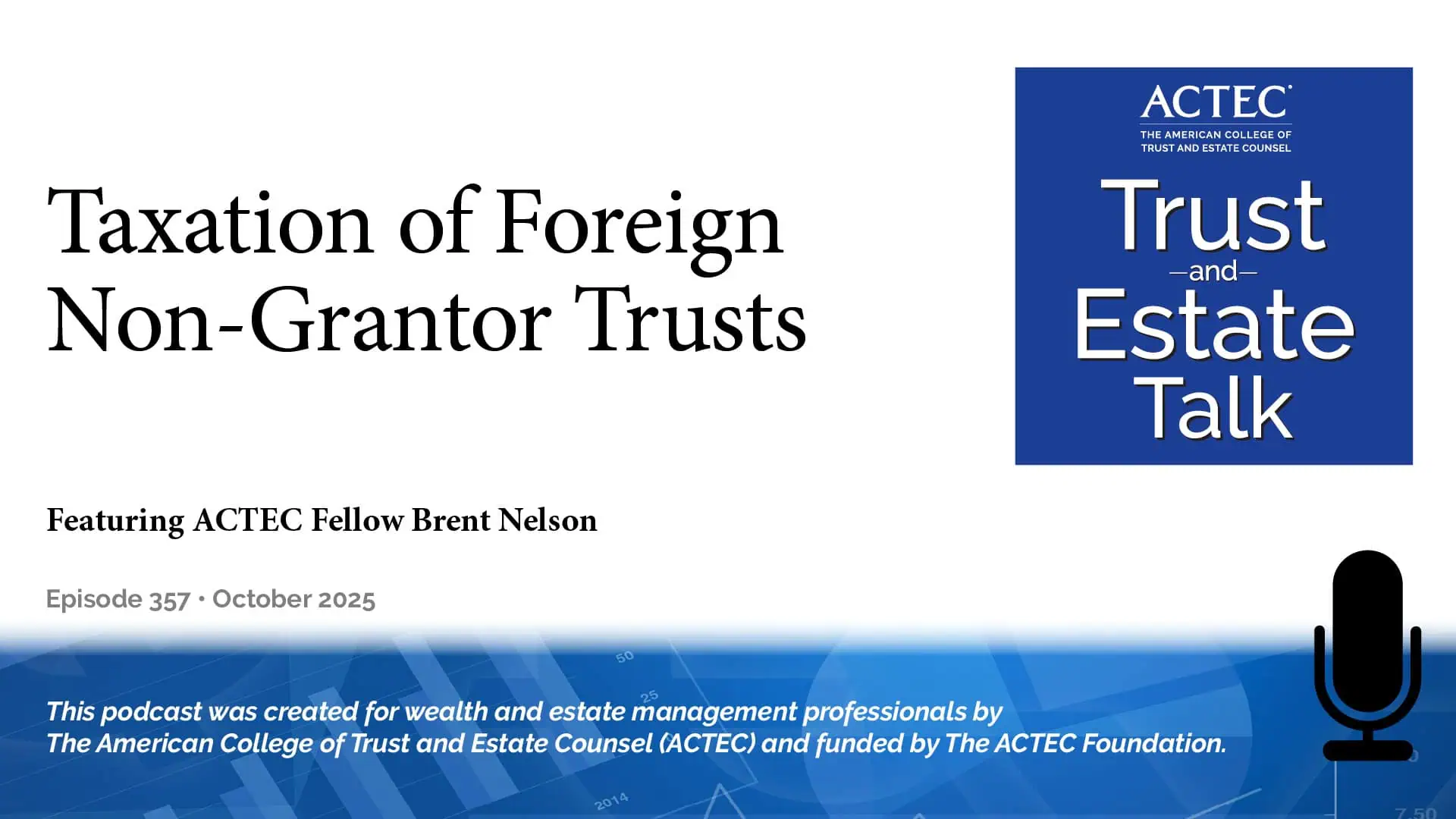
Taxation of Foreign Non-Grantor Trusts
Learn how U.S. tax rules affect foreign non-grantor trusts and discover key strategies for cross-border estate planning and compliance.
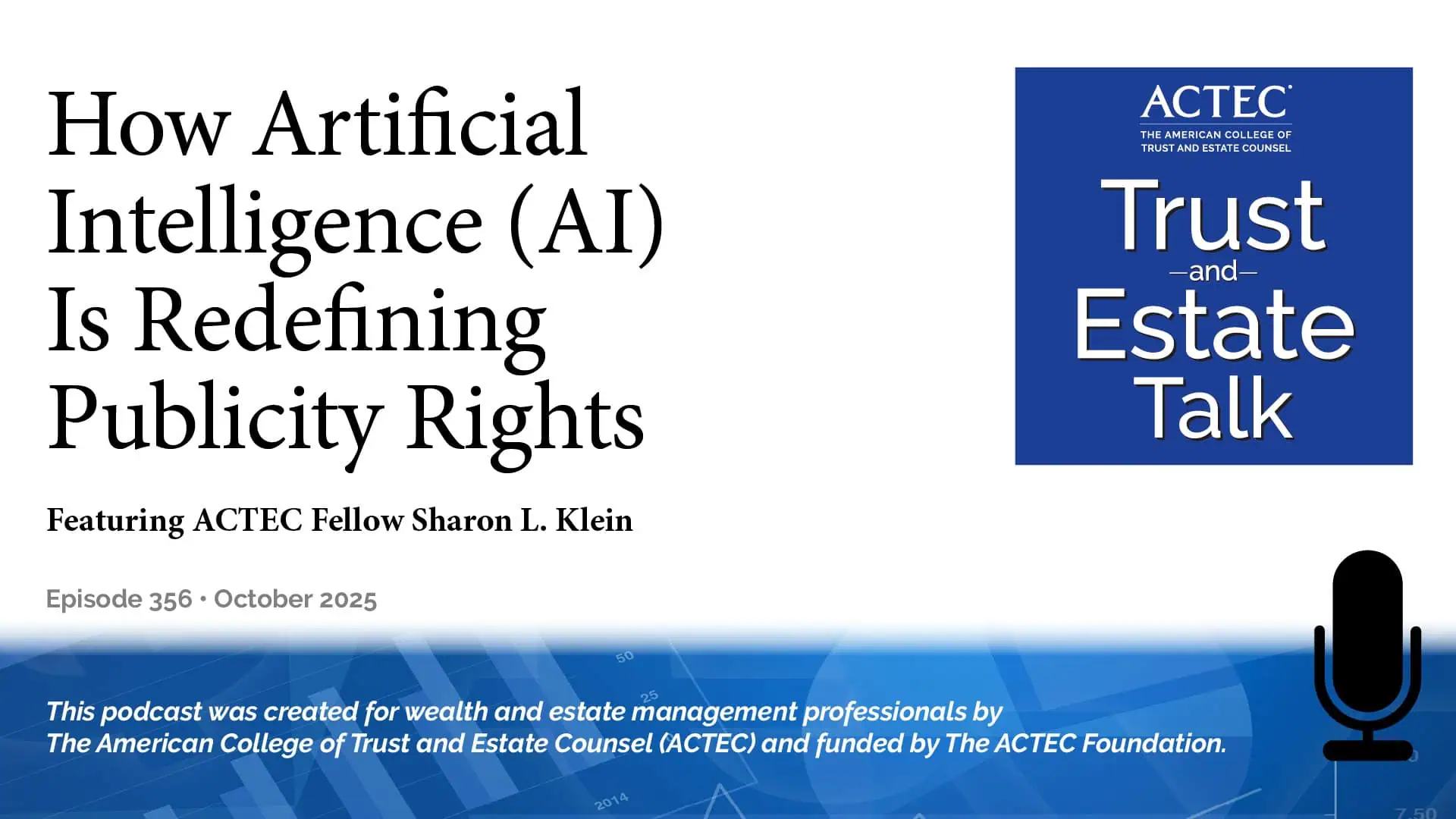
How Artificial Intelligence (AI) Is Redefining Publicity Rights
Explore how AI, deepfakes, and digital replicas are reshaping publicity rights, estate planning, and legacy protection.




